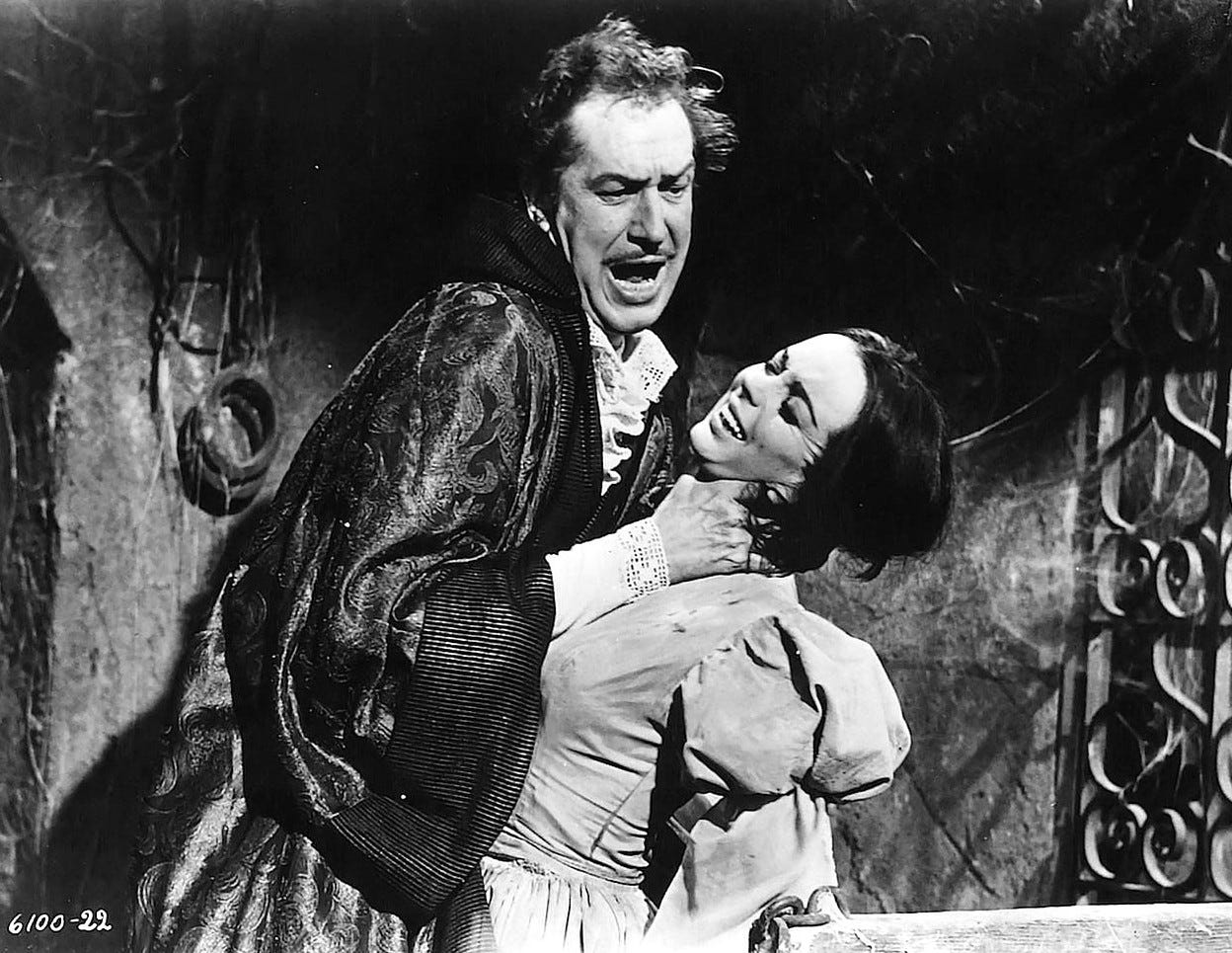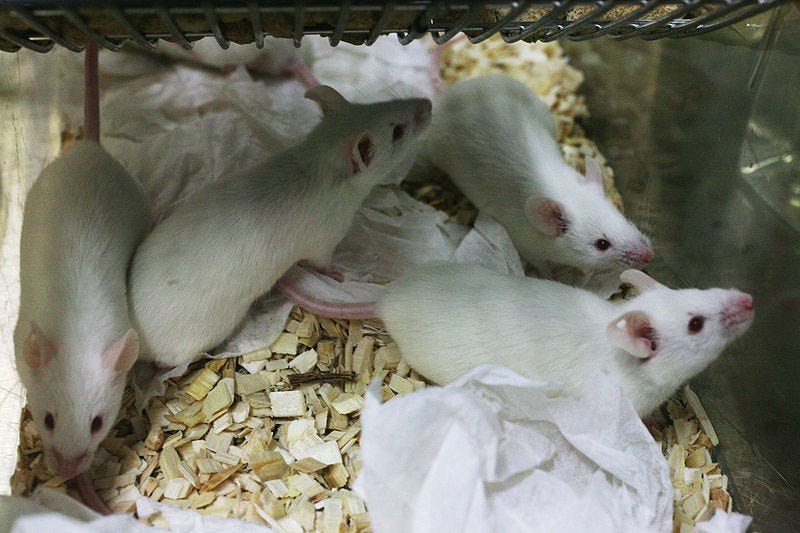Where Does 'Slavery Trauma' Really Come From?
Is it epigenetic, or do we all traumatize ourselves with historical knowledge?
The dreams of medieval tortures began when I was around seven or eight.
I can’t remember the brutal details, but generally — men coming after me, wanting to torture me. The dreams petered out, then flared up many years later. Burning stakes, cages and sharp blades. One memorable device I wasn’t even familiar with. The huge heavy weight looked like a child’s top, flat above, tapering to a dull but broad point. My persecutors wanted to center it over my belly and crush me. When I awoke I thought, “What the hell? I’ve never even read of anything like that.”
Past-life memories? Intergenerational trauma? Psychically tuning in to another time?
Maybe. Although the earliest dreams started when I read my first book on the European witch craze. Written for children, its descriptions of interrogations, tortures and executions were nevertheless graphic. It was too upsetting to finish.
Later nightmare revisits coincided with my exploration of Wicca. My adult reading now contained far more graphic historical descriptions, and I also had a better idea of what a torture chamber looked like thanks to old Vincent Price movies and a Gilligan’s Island episode in which the castaways are held but not harmed in a mad scientist’s torture chamber.

I learned that there was, in fact, a torture device rather like my belly crusher. But I wonder: Was it a past life memory, or had I learned about it years prior and forgotten it? One’s unconscious doesn’t forget as easily as the conscious mind shocked into welcome forgetfulness. I can’t swear I hadn’t learned about it when I was younger.
Memory is odd; we forget things. When reminded, we may not even recall a sense of familiarity of once having known it. I read years ago about a woman who ‘remembered’ a past life involving a minor historical incident in which she recounted details confirmed by other history books. Turns out earlier records had gotten some details wrong. They’d been corrected in modern versions. She’d ‘remembered’ not the incident that happened, but the faulty narrative in a childhood book.
Coleman Hughes - American writer and podcast host, vile conservative lackey to illiberals, a breath of fresh air to us remaining libs—has just published a new book, The End of Race Politics: Arguments for a Colorblind America. One might call him downright reactionary for suggesting we return to an earlier time for America when many civil rights leaders prescribed striving for colorblindness, and blamed racial inequities more on class struggles than systemic racism, even as Hughes acknowledges its current existence. He scandalizes ‘woke’ progressives when he dreams of a ‘colorblind’ America in which we recognize race, but treat each other like we do others.
Easier said than done in the Ignited States of America, but seemingly doable in Canada, which doesn’t suffer from the lengthy slave legacy of America. Racism exists here, but is less prone to the racial hysterics of ‘woke’ American antiracism, which claims modern trauma from a slave history that ended nearly 160 years ago.
No one is truly colorblind, but we can work toward it, and Hughes (I haven’t read his book yet) smashes the woke lunacy holding that claiming to be ‘colorblind’ is racist, and questions whether one can suffer trauma from things that happened to others.
It would certainly give the rest of us opportunity to claim historical trauma, since it’s the story of the human race, although interestingly we never seem to suffer it if we don’t know what our ancestors went through.
Like, I don’t have PTSD from my French ancestor who fought in Napoleon’s army and must surely have seen some shit. Nor did I know anyone growing up who suffered post-generational trauma from fathers who served in Korea or grandfathers in WWII.
Colorblindness may be naive, for sure, but racist it ain’t. Not when one is making a good-faith effort to not be racist, however imperfectly. As any white person subjected to woke racism knows, there is no escape from being cast as a ‘white supremacist’. Even if you think you’re not, you are. White skin is the Mark of the Beast.
Hughes’s skepticism of appropriated trauma caught my eye in his own article about his book on The Free Press. He questions the claim of PTSD (‘Post-Traumatic Slavery Disorder’) for those who’ve lived a more privileged life than their ancestors.
Hughes briefly touches upon the emerging science of epigenetics, which explores whether historical trauma can become encoded in our genes. It’s an interesting theory which requires a lot more research. The early science leans that way, with experiments on rodents and nematode worms, with whom you have more in common, genetically, than you’d like to know. Genetic memories go back as far as 14 generations for our wormy cousins, and if it ultimately proves similar for humans, that’s 350–500 years back depending on how you count the length of generations. So yes, we could all hypothetically have genetic memories of trauma.
Lab mice taught to fear and avoid a scent similar to cherry blossoms passed on that fear to the next generation.

What I find a little questionable about human ‘inherited trauma’ is it only seems to affect people whose ancestral trauma was inflicted by white people. Other groups besides black Americans lay claim to inherited trauma too—specifically Native North Americans from white hands.
But I wonder: How much of the spiritual trauma is caused by ‘ancestral memories’ or ‘genetic trauma’, versus how much of it is historical learning?
Trigger warning: Some descriptions of medieval and Native American tortures and violence follow.
I have a horse in this race myself, as I stated earlier. After reading about witches and fueling my nightmares with old horror movies, I became a modern-day Pagan over thirty years ago.
I’ve witnessed and felt that same toxic confusion between the nightmarish abuses of centuries past, with the aggressive feelings and sometimes downright loathing for people today — modern men and the Catholic Church (the primary villains of the Witches’ Narrative).
You see it when some female writers recount the tortures of the damned for moderns, in case we weren’t aware of how they ripped flesh from bones with red hot pincers or how the strappado worked. Let’s pour lemon juice on our wounds by describing in gruesome detail burning rods driven up vaginas, iron cages over hot coals, the rack tearing female joints apart like a hungry warrior with a leg of mutton.
And yeah, they did those things to Jews, Muslims, atheists, heretics, and other assorted ‘not the right kind of Christians’.
By the time you were done reading that shit, you were ready to firebomb your local St. Peter’s.
Our angry feelings also bled over to modern men, most of whom, as far as we knew, thought the Spanish boot was something worn by hipster metrosexuals.
We conflated the abuses of patriarchal dead guys with priests who no longer torture or burn women at the stake.
I might arguably have my own ‘inherited genetic witch trauma’, as my genealogy stems primarily from France, a hotbed of witchmania, as well as England and Germany. England was a better place to be accused, Germany the worst. England eschewed the cruelest tortures, and preferred hanging for execution; Germany refined maximizing human suffering to a hellish art form and death by stake-burning took much longer. And they managed to make it even worse while you waited to die. Don’t ask. Just don’t.
But I can’t say my dreams aren’t a direct result of my early childhood books and movies, and my draw to Wicca may be laid directly at the feet of an old Wiccan boyfriend in Massachusetts, where Paganism is no longer an executable offense.
Why isn’t anyone who doesn’t read history books experiencing intergenerational ‘inherited trauma’? American blacks speak of the damage caused them by the American slave system, but never of the ancient system that existed in pre-colonial Africa. Nor does any modern black woman, to my knowledge, claim ‘ancestral’ damage stemming from a 2,000-year-old legacy of one of the worst human rights abuses ever, believed to have originated in Africa: Female genital mutilation.
Where is epigenetic legacy of pre-European, Middle Eastern, Indian, and Eastern Asian slavery, along with FGM? American slavery ended in the 1860s; FGM, along with slavery, is still practiced in some parts of Africa today.
As for horrible slave ‘memories’, we are all likely descended from slaves.
It’s a universal institution, spanning thousands of years and just about every single human community. We are blind to probably more than a few slave owners and traders in our own family trees. Black Americans’ genealogies, sundered by the slave trade, disappear only a few generations back, so they need never confront their own ugly past on the other side of the auction block: When their ancestors bought, sold and traded other human beings.
Then there’s pre-European Indigenous violence. Again, don’t ask. But if you insist, go here. I’ll give you the thumbnail sketch: Mass murder, roasting alive, rape, torture, shit with pointy sticks you don’t want to know about, slavery (of course) and cannibalism. And that shit was just a few hundred years ago.
Native Americans experienced horrendous genocide efforts from European colonists, but no one ever expresses ancient memories of being slowly roasted over a fire by warriors who looked a lot like themselves. Perhaps today’s slavery-traumatized modern blacks have done it to themselves with their own historical research, and, does mishandling that knowledge cause them to excoriate the wrong people? Are there better ways for all of us to handle knowledge of ancient abuses against our forebearers?
I believe we must never forget history; we can never know too much, we must drill down forever deeper for new insights into the human condition and behavior; where we’ve come from, where we are, where we’re going. As ugly and traumatic as it is to revisit the trauma of slavery, or witch hunts, the danger lies in allowing ourselves to feel too victimized and even worse, to confuse the descendants with the villains of those dark times.
The new conflation of ‘white supremacy’ with all white people today I believe is fed by an unhealthy preoccupation with the slavery era. I mean, we fought a damn war over it, people!
It drives misplaced black aggression, confusing white people today with the slave owners of the past. As bad as modern, true white supremacists are, they’re a much tinier representation of white Americans.
There are plenty of reasons for black Americans and women to be angry; but not for something no one supports anymore. It’s counterproductive to add needless anger aimed at moderns for things that happened generations ago.
Women should be angry at patriarchal abuses today, but no longer for the wheel or the rack or Vincent Price’s famous pendulum. It makes no sense to be angry at Catholic priests anymore for abuses against women they haven’t practiced in hundreds of years; let’s instead excoriate them for the way they’re abusing children now.
I don’t frankly care whether any of us are suffering ‘epigenetic’ or ancestral trauma. It’s the entire story of human history: Humans treating each other like absolute shit since we came down from the trees. We can be outraged by the oppression and cruelties of the past while keeping it in our modern-day perspective.
Let’s continue drilling down deep, understanding the prejudices and conscious or unconscious biases that drove our ignorant ancestors, and recognize we all descend from cruel, stupid human beings, and that we’re not as morally far removed from them as we’d like to think. The baying human jackals of X and Instagram—on the right and the left—greatly resemble those whose cries arose for Nero’s circuses and Shakespeare’s bear-baiters. Human trafficking is also universal, including in your own country. Anyone who watches porn is pretty certainly supporting human slavery. Yes, we’re so much more civilized now.
I will join the iconoclastic Coleman Hughes and other human progressives who encourage a return to sane, common-sense social justice values while we pull down ‘antiracism’s’ false idols: DEI, ‘Doing the work’, which too many of their own refuse to do, and ‘tolerance’, but only for themselves and their opinions.
I’m done with the wounds of the past. The dreams have stopped screaming. I no longer live in the seventeenth century, and I hope ‘antiracists’ emigrate from there too.
Trust me, for all its faults, the 21st-century is waaaaay better.
This article is partly repurposed from one I wrote for Medium in 2021.







How can any of us judge or qualify the damage passed down over generations who perpetuate trauma on successive generations? It's impossible. Just no way to evaluate that, so it's folly to think that we can. A subjective experience happens regardless of cultural knowledge or a historical context. If my mother beats me, and 8 generations of her people beat their kids, I don't need a history lesson to frame it as destructive or traumatic. Cultural references aside, it still hurts. Research into epigenetics is also demonstrating how trauma affects us on the cellular level, carried into the next generation. Why would that only carry forward a few decades? Nah, we can't possibly evaluate how far forward trauma and PTSD will ripple.
This article reminds me of the heavily used principal guiding Canadian policy makers "Substantive Equality". At it's core it is the idea that any discrimination based on race, gender, religion, ... can be justified so long as it is seen as righting some real or imaginary wrong from in the past. This concept is in the Canadian Charter of Right and Freedoms where one paragraph says you can't and the next describes the exceptions where you can discriminate.
https://sac-isc.gc.ca/eng/1583698429175/1583698455266
Essentially this is equality of outcome over opportunity and social justice over merit.